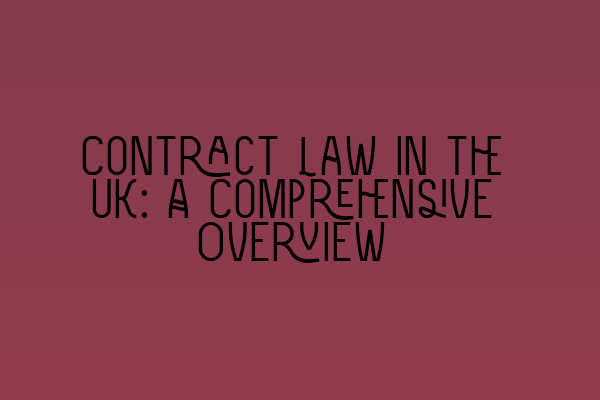Contract Law in the UK: A Comprehensive Overview
Contract law is an integral part of the legal system in the United Kingdom. It governs the formation, interpretation, and enforcement of agreements between parties. Understanding contract law is essential for individuals and businesses who engage in transactions and want to ensure their rights and obligations are protected.
1. What is a Contract?
At its core, a contract is a legally binding agreement between two or more parties. It outlines the rights and duties of each party and provides a framework for the performance of certain obligations. Contracts can be written or verbal, although the enforceability of verbal contracts is subject to certain limitations.
There are four essential elements for a valid contract:
- Offer: An offer is a promise made by one party to do something in return for something else.
- Acceptance: Acceptance occurs when the offeree agrees to the terms of the offer.
- Consideration: Consideration refers to something of value exchanged between the parties, such as money, goods, or services.
- Intention to create legal relations: Both parties must intend for the agreement to be legally binding.
It’s important to note that certain types of contracts, such as those relating to land or the sale of goods, may require additional formalities to be valid.
2. Types of Contracts
There are various types of contracts in UK contract law. Here are a few common examples:
- Express Contracts: These contracts are explicitly stated, either orally or in writing, and clearly outline the terms and conditions agreed upon by the parties.
- Implied Contracts: Implied contracts are not explicitly stated but are inferred from the conduct of the parties. These contracts are based on the actions or behavior of the parties involved.
- Unilateral Contracts: In a unilateral contract, one party makes a promise in exchange for the other party’s performance. The contract is formed when the specified action is completed.
- Bilateral Contracts: Bilateral contracts involve mutual promises between the parties. Each party is obligated to perform certain actions or provide something of value.
Additionally, there are specific types of contracts that may require special considerations, such as contracts for the sale of goods, contracts for services, and contracts for the sale of land.
3. Interpretation of Contracts
Once a contract is formed, the next step is interpreting its terms. While some contracts are clear and unambiguous, others may require interpretation. The courts employ various rules and principles to determine the meaning of contractual clauses.
When interpreting a contract, the courts consider:
- The ordinary meaning of the words used
- The context in which the contract was formed
- The intentions of the parties at the time of entering into the contract
- Any relevant industry practices or customs
In cases where a term is ambiguous or uncertain, the courts may interpret it in a manner that is reasonable and aligns with the intentions of the parties.
4. Breach and Remedies
When one party fails to fulfill their contractual obligations, a breach of contract occurs. Depending on the circumstances, there are several remedies available to the innocent party. These include:
- Compensatory Damages: The innocent party may be entitled to monetary compensation to recover any losses or damages suffered as a result of the breach.
- Specific Performance: In certain cases, the court may order the defaulting party to fulfill their obligations as specified in the contract.
- Rescission: Rescission allows the innocent party to cancel the contract and be restored to the position they were in before the contract was entered into.
- Injunctions: An injunction is a court order preventing a party from taking certain actions or requiring them to perform specific acts.
The choice of remedy will depend on the nature of the breach and the desired outcome of the innocent party.
5. Limitations and Considerations
While contracts are essential for establishing legal obligations, it’s important to be aware of certain limitations and considerations:
- Capacity: Not everyone has the legal capacity to enter into a contract. Minors, those lacking mental capacity, and individuals under the influence of drugs or alcohol may not be bound by a contract.
- Illegality: Contracts with illegal purposes or contrary to public policy are unenforceable.
- Mistake: If a mistake is made when forming a contract, it may be deemed void or voidable.
- Third-Party Rights: In some cases, third parties may have rights or obligations under a contract, depending on the circumstances and the intentions of the parties.
It’s always advisable to seek legal advice before entering into significant contractual agreements to ensure your rights and interests are protected.
6. Conclusion
Contract law plays a vital role in facilitating commercial transactions and protecting the rights of individuals and businesses in the UK. Understanding the essentials of contract formation, interpretation, and enforcement is crucial for success in various industries and sectors.
If you’re preparing for your SQE exams, be sure to check out these related articles:
- SQE 1 Practice Exam Questions
- SQE 1 Practice Mocks FLK1 FLK2
- SQE 2 Preparation Courses
- SQE 1 Preparation Courses
- SRA SQE Exam Dates
Good luck with your studies!
